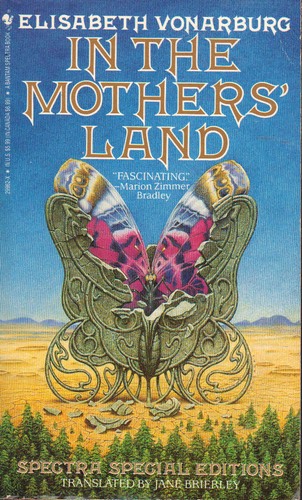 alternate title: The Maerlande Chronicles
alternate title: The Maerlande Chronicles
translated from the French by Jane Brierley
Bantam Spectra
November 1, 1992
512 pages
I had never read anything by Élisabeth Vonarburg before, so when I came across this beautiful edition of her novel In the Mothers’ Land at the most recent WisCon, I couldn’t resist. Having heard/read so much about this Québec-based science fiction writer, I knew that I wouldn’t be disappointed. Not only was I not disappointed- I was so thoroughly taken in by this story of a young woman questioning the bedrock beliefs of her society that I am now on a mission to read everything Vonarburg has ever written or will ever write.
The second in a proposed trilogy (The Silent City is the first), In the Mothers’ Land was originally published in French in 1992 and then translated and released in the US and Anglophone Canada. Set in a far future female-dominated society, the novel ultimately reveals that this configuration emerged following what the characters call “the Decline” and a subsequent period of “Hives” and “Harems,” in which a dwindling male population exerted total control over women. At some point, women rebelled and overthrew that system, establishing several tenuously-connected settlements (generally named Maerlande) where everything down to the language is feminized and the few males who are born are raised to simply help carry on the various genetic lines.
What the novel is really about, though, is how we understand our past and the ways in which we create historical and religious narratives in order to explain it. Indeed, In the Mothers’ Land is a bildunsgroman- the story of Lisbeï’s spiritual, moral, and social education and her ultimate rebellion against the only life she’s ever known. Never content with the seemingly easy answers given to her by her teachers about the origins of her community and the nature of the divine, Lisbeï winds up discovering a notebook in a centuries-old prison that calls into question some of the most fundamental religious beliefs held by the people of Maerlande. Further archaeological digs and translations of unearthed texts (fragments, letters, notebooks) lead Lisbeï to conclude that the double death-and-resurrection of Garde (a Jesus figure) and the circumstances in which it occurred were not as factually true as she had been taught to believe. Such revelations throw the entire society into tumult, with various factions arguing with one another about questions that no one can ever answer.
Lisbeï is special for other reasons, though. She has the ability to clearly sense other people’s emotions just by being near them (she calls it “the light”) and is derailed from becoming the Mother (or leader) of her settlement (Bethely) because she’s thought to be sterile, having survived the Malady that most children get before the age of seven, and from which many die. When Lisbeï reaches her teenage years, she’s no longer a Green (child), but is also not a Red (fertile woman). Thus she’s classified as a Blue–someone who is free to pursue whatever path in life she chooses, whether it is as a teacher, explorer, or other professions necessary to help keep this post-technological society running.
Her discoveries also prompt Lisbeï to think more deeply about what lies beyond the known world of the settlements–are the Badlands as contaminated as they’re claimed to be? Does anyone live on the Western Continent? If so, why haven’t they established contact with Maerlande over these four hundred years?
This is just the tip of the iceberg, dear reader. Lisbeï’s complicated relationship with her “sister” (a term not used in Bethely) and her mother, her gradual realization that men are not only outnumbered but also marginalized, and her refusal to accept any “truths” at face value make this woman one of the most compelling in science fiction. Vonarburg never depicts her as fearless or overconfident, instead encouraging us to see Lisbeï as the epitome of the analytical student determined to find answers to questions others wouldn’t dare ask, such as from where did the concept of Elli (God) come? why did Garde die and return to life twice? can historical records change deeply-held religious beliefs? Is a female-dominated society the epitome of social organization, or did another kind exist (before the Decline) in which women and men were free to fall in love and raise their own children?
A complex, engrossing novel of grand ideas, beautifully translated by Jane Brierley, In the Mothers’ Land is the kind of book that everyone should read, science fiction fan or not.

1 comment on “Review: In the Mothers’ Land by Élisabeth Vonarburg”